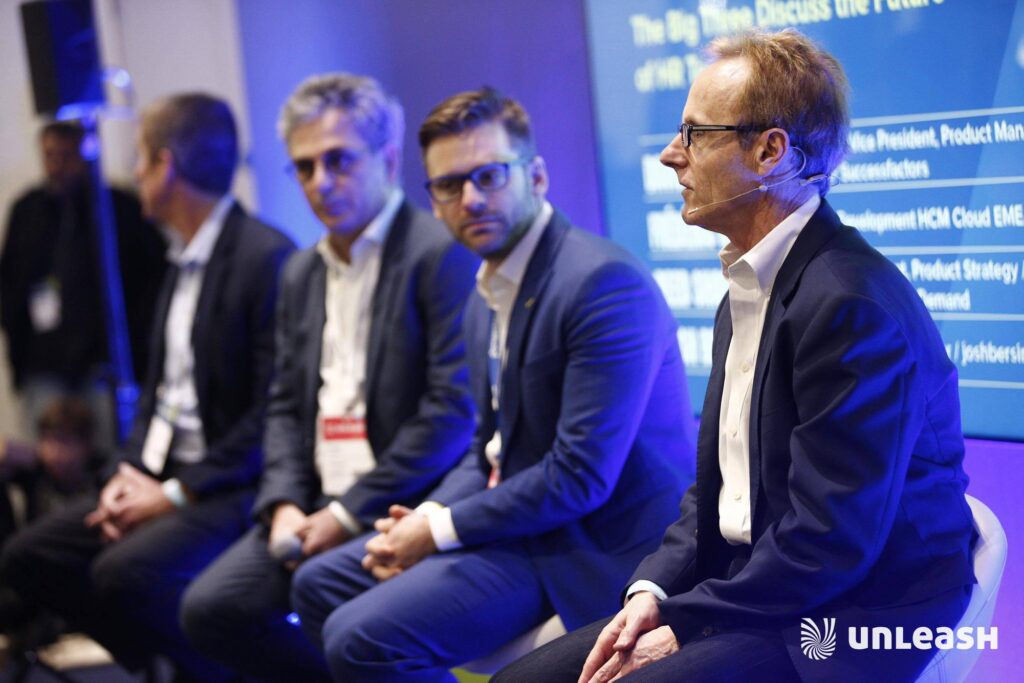If you missed Josh Bersin’s fast-paced, ears-on-the-ground update on the HR tech landscape at UNLEASH London this year, fear not. Here’s a condensed version to get you up to speed.
Closing day one of UNLEASH, Bersin’s session ‘A wild new world of HR technology’ endeavoured to help the HR professional make sense of a highly innovative, yet overwhelmingly confusing vendor space. With huge investments currently being made in HR tech, over a decade of economic growth and capital stock markets at a high, the marketplace has boomed… to the point where Bersin likens it to a ‘gigantic hurricane’.
To help you battle through this ferocious cyclone towards the calmer eye of the storm, Bersin has mapped out the areas to watch out for:
Will technology turn the dial on productivity levels?
Technology has got its work cut out with fixing, or adapting to, some of the shifts taking place in the working world today. We have a significant battle for skills well underway, big changes in demographics, a rising gig economy and ongoing challenges with maintaining a highly engaged and productive workforce.
The HR tech industry is working hard and fast to provide solutions for businesses dealing with these obstacles and movements. But Bersin highlights that while the pace of adoption of these new tools and devices is extremely rapid, the labour force is working harder than ever before. Why is that?
Put simply, employees are overwhelmed. We’re all suffering from information overload and device addiction – something which Baroness Susan Greenfield discussed in more detail in her neuroscience talk at UNLEASH – and it’s negatively impacting our sleep, stress levels and overall wellbeing.
Our advancements in technology make it harder to escape from our work. Bersin believes we need technology to fix the very problem that it’s caused and become a tool to help us switch off.
Engagement is on the increase…
On a more positive note, Bersin outlined that employee engagement is on the up by almost 9%. One of the reasons behind this is that we’re now getting better at listening to the wants, needs and movements of our employees. And the vendors are responding well to this by embedding feedback capabilities within their HR systems.
How can we ensure we maintain this engagement growth? It’s all about data, and what we do with it Bersin argues. We have access to so many valuable insights on our people today, but we need to figure out how to use these as tools to continuously drive engagement.
Trust is on the decrease… but not towards employers
While engagement at work rises, trust is at an all time low. Bersin referred to the 2019 Edelman Trust Barometer Report, which shows that 46% believe the system is failing them and only 48% trust government.
The good news is that 75% trust their employer, making employers the number one most trusted institution in the world. “We need to live up to this,” Bersin urges.
The way we manage people today has dramatically changed from traditional methods – it’s team led, project led, feedback driven and development focused.
HR in the flow of work is trending
In an effort to improve productivity levels, the big trend right now in HR tech is working ‘in the flow’. “We’ve moved from HCMs to talent management to HR in the flow of work. From systems of automation to systems of engagement to systems of productivity,” Bersin explained. “But can these systems make work better and help us facilitate the way we work today in teams in the digital environment?”
The vendors are certainly trying to meet these expectations. In the core HR tech space we’re seeing huge investments being made and many new innovative systems coming into play.
Bersin highlighted that every major company – Microsoft, LinkedIn, ServiceNow, Facebook – is getting a piece of the action and the stakes are high. But what’s important to note is that their focus is shifting to create more ‘meaningful’ systems that support employees ‘in the flow’ with models that are more network based, agile and team-centric.
A new talent management model has arrived
The way we manage people today has dramatically changed from traditional methods – it’s team led, project led, feedback driven and development focused – and this resulted in huge disruptions in the talent management tech space, Bersin stated. In response, new talent applications have been born to help with these changes, while larger talent companies have had to reinvent themselves to remain competitive.
Looking at the talent acquisition space, huge investment has been made here too. “The amount of innovation in recruiting is astounding,” Bersin exclaimed. One significant advancement is the implementation of AI to improve the hiring process and help overcome unconscious bias.
And what about talent planning ahead of recruiting? HRZone spoke with Jerome LeClercq, Senior Product Marketing Manager at LinkedIn, during UNLEASH about its expansion from the recruiting space into the pre-recruitment space with Talent Insights, a new platform that supports HR with building a more informed talent strategy. This is an exciting move in the HR tech arena. Will more follow suit?
The wellbeing market ‘explodes’
With pressure on HR to make the workplace not only more productive, but also healthier – in an effort to repair an area previously neglected by businesses – the wellbeing market has rapidly expanded, Bersin stated.
Workplace wellbeing providers are not just focusing on physical and mental health, but taking a holistic view on a person’s wellbeing in every aspect of their lives. Financial wellbeing is one area in which the wellbeing market has migrated into recently in an effort to help employees better manage their money to reduce financial stress and improve performance at work.
Feedback is king
First we had the annual employee engagement survey, then we started to do pulse surveys, and what’s next, according to Bersin, is AI-based recommendations, messages and nudges that better engage employees and teams.
“The employee experience problem is all about listening and gaining an understanding of what is tripping people up at work. If we can collect that kind of data and put that into an AI engine, we will make the workplace a lot better,” argued Bersin.
Once upon a time (not that long ago) we assumed that by replacing our outdated HR platform with the latest shiny piece of technology, the employee experience would naturally improve… but it never did. Something was missing.
Corporate learning is back on the priority list
The skills gap is not just in the tech sector, all skills are in demand and people are moving between jobs faster than before, therefore continuous reskilling is important for businesses, Bersin highlighted.
In consequence there’s been an explosive growth in microlearning, and learning experience platforms are being added on to, or replacing, the LMS to deliver learning in the flow of work.
New tools for employee experience
Once upon a time (not that long ago) we assumed that by replacing our outdated HR platform with the latest shiny piece of technology, the employee experience would naturally improve… but it never did. Something was missing.
Employees need to be shielded from the complex view of the many HR platforms we use, Bersin highlighted. This requires some kind of middle layer, such as an AI chatbot, that takes requests and provides information through one point of contact.
“The implication of this is much bigger than you think,” Bersin argued. “We must explore how we can reorganise HR itself so we can improve the employee journey.”
Fast-paced change in HR tech is going strong – and with it comes both promise and feelings of bewilderment. You will likely struggle to keep astride with the intricacies of progress in the vendor space, but understanding the overriding shifts will help your business weather the storm.









